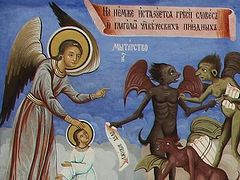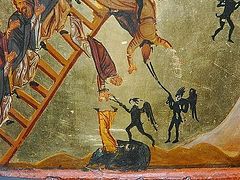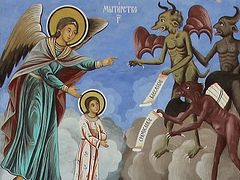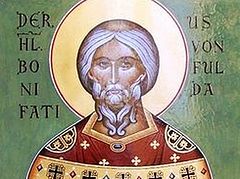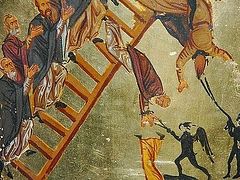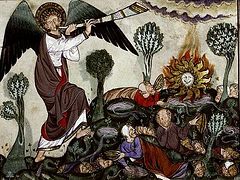 Metropolitan Pavel of Vyshgorod and Chernobyl with his mother
Metropolitan Pavel of Vyshgorod and Chernobyl with his mother
For a child, there’s no such thing as bad parents, and for parents—bad children. Our father and mother had nine of us, but the Lord took one of us away from this life during infancy. We had a Christian upbringing and had a very religious mother and grandmother on my mother’s side. However, our father was a Protestant. Although we were born in such a family, all of us were baptized in the Orthodox Church eight days after our birth. Our father never forbade us to go to church, although he himself only prayed the “Our Father” and never made the sign of the cross. He was strict in our upbringing and always said, “One that’s been caned is worth two that haven’t”. We would also remember the following words that he used to say: “I’d rather endure pain once than be ashamed of my children for the rest of my life.”
When I was about sixteen or seventeen years old and was in high school, then, out of interest, I visited some Protestant congregations a few times. I wanted to understand their perception of the faith, what kind of spiritual state they were in, and what they do during their so-called services. But there I saw the absurdity and emptiness of these people. Truly: This people draweth nigh unto me with their mouth, and honoureth me with their lips; but their heart is far from me (Mt. 15:8). If a person pulls out the bricks holding together his house, it will surely fall. The same happens when people abolish the dogmas of the Church, the structure of the services, the Holy Tradition of the Church and the Apostles.
In 1985, when I was a student at the Moscow Theological Academy, I asked my father to disown me. My father looked at me with pity and said, “You’re a foolish person. I really wanted children, but the Lord wouldn’t give me any—your mother was sick at that time. But I prayed and asked, and the Lord gave me you. How can I disown you? And the rest of you too? You’re my flesh and blood, my life and my joy”.
I said these things because I really wanted my father to get baptized. I didn’t have the right to pray for him in the altar or commemorate him during Liturgy, and that was very painful for me. I loved my father with all my heart, as he did me. Dad always helped mom, never offended us, and never punished us without good cause. When we were little, he would win us over with candy and cookies, took us sledding, played hide and seek, and went skiing with us.
To put it shortly, back then, in 1985, we talked on the Nativity of Christ, and, having achieved nothing again, I was heading back to my “alma mater”, Trinity Sergius Lavra, where my spiritual birth would begin. Two days after the Feast of the Presentation of the Lord in the Temple, I received a telegram inviting me to have a conversation over the phone with my parents.
“What joy!” said my mother. “On the eve of the Presentation your father was baptized. All of the children and grandchildren were there with lighted candles. He arranged everything with the priest himself, chose who his godparents would be, got ready, and it happened—it’s a miracle”. I think that first and foremost this was a miracle for me.
Then on the next day my father went to church for the feast to participate in the Eucharist. However, he just couldn’t understand: how can one receive the Body and Blood of Christ? This seems to have disquieted his soul a little bit. Something like this can happen with one whose heart the Lord has not yet touched. After “the Holy Gifts are for the Holy” was chanted, my father started coming up to the Chalice with the other people. And lo, what a wondrous miracle! The Lord works out the salvation of people in different ways. Instead of seeing bread in the spoon, my father saw the Risen Christ standing and looking at him.
My father later on told us: “I wasn’t just afraid—I didn’t even know if I was standing on the ground, or if it had disappeared from under my feet. And a thought scorched my mind: ‘How can I receive Him inside myself?!’ So I stood frozen for about a minute, but the people behind me started nudging me, saying: ‘Lebed (they were used to calling us by our surname in the village), go on!’ And at that point the Risen Christ had changed back into the form of a piece of bread, and I received Communion”. The priest would later recall: “I saw that in an instant he became covered with sweat, which was pouring off of him like raindrops, and I couldn’t understand what had happened”. When my father walked away from the chalice and went to partake of the antidoron and wine, he again saw the small radiant figure of the Risen Christ. This was how the Lord had strengthened him and dispelled his doubts.
I can’t say that my father was very diligent in going to church—he didn’t attend every Sunday service, but he always did attend services on the twelve Great Feast days, and later on he kept the fasts together with my mother. After this the question of completing the third sacrament arose—the sacrament of Holy Matrimony (marriage). But the enemy of the human race kept diverting him away from the truth, and when I would talk about the wedding, my father would either say that he doesn’t have dress shoes, or a shirt, or a suit. At one point I went to the store and bought everything that was needed, carried it home, and said: “Here’s everything you need for the wedding”. And it was as if the devil had taken precautions after perceiving my father’s good intention and my perseverance! My father got into a quarrel with my mother and stopped talking with her right before the day he planned to visit me in Novovolynsk in 1988 on the eve of his name day. But my sisters Natasha, Nina and Valya started telling them that they have to go: “Batushka is waiting”. And so in the morning they left for Lutsk, still not having reconciled with each other; but after getting on the bus from Lutsk to Novovolynsk, my father started saying: “Do you want your wish to be fulfilled? It will be, because I gave a promise to God and batushka”.
My father and mother had arrived, and I completed the Sacrament of Matrimony for my parents—Dmitry and Nadezhda; and also for the parents of Fr. Victor—Alexei and Sophia, with whom I had lived for some time. My father was fifty-five years old at the time and my mother was fifty-three. The Sacrament was fulfilled in a very festive manner; it was a great joy for me, because I had wedded them myself. The choir sang beautifully, and our relatives were there. After the wedding we gathered together and had a modest celebration. And afterwards with the help of God they continued living together.
 Metropolitan Pavel of Vyshgorod and Chernobyl Years passed, the children grew up and went away, and my parents were alone again. One morning my father woke up and told my mother about a dream he had. He saw all of our loved ones who had passed away, and they were all sitting at a table in our garden and asking him for a drink of cognac. It’s worth mentioning that my father helped many people out. Our parents were looking after two women, and also after an elderly family—our neighbors old man Sidor and his wife Maria, whose daughter had refused to support them—and my father would bring them food. Sidor had taught me a lot about the historical understanding of the Holy Scriptures, and, thanks to his knowledge, when I entered seminary, I didn’t have to open up any books on this topic for two years, because I already knew all of the material.
Metropolitan Pavel of Vyshgorod and Chernobyl Years passed, the children grew up and went away, and my parents were alone again. One morning my father woke up and told my mother about a dream he had. He saw all of our loved ones who had passed away, and they were all sitting at a table in our garden and asking him for a drink of cognac. It’s worth mentioning that my father helped many people out. Our parents were looking after two women, and also after an elderly family—our neighbors old man Sidor and his wife Maria, whose daughter had refused to support them—and my father would bring them food. Sidor had taught me a lot about the historical understanding of the Holy Scriptures, and, thanks to his knowledge, when I entered seminary, I didn’t have to open up any books on this topic for two years, because I already knew all of the material.
And then, after that dream (though I don’t believe in dreams), my father said to my mother, “Nadya, my time has come; I’m going to die soon”. But she didn’t take his words seriously: “What are you going on about again?! Stop cluttering up your mind with that”. But he remained firm and said: “You’ll see”. This was in September. Before father would sometimes say that if he were to get cancer, then might kill himself, because he was afraid of suffering and didn’t want to burden anyone. He was never sick and was so strong that he could lift more than 100 kilograms using his teeth. But I prayed to the Lord that if He were to send such a spiritual trial, that He would not allow anything to happen that would not be in accordance with His will, even if it meant that my father would have to pay with his arms and legs for it. And the Lord heard my prayers.
My father had lung cancer, which he had since 1972, and everyone knew about it. But the disease was sort of “locked up” and was not spreading. But then, having received a rib fracture that punctured his lungs to a certain depth, even though they healed afterwards, the injury caused the cancer to progress. He underwent an MRI scan in Lutsk which discovered two brain tumors that had already metastasized. Then, when Alexander Yurievich Usenko, the professor and director of the Shalimov Institute, who, when it came to diseases, was the savior of me and my family, did another MRI scan, the number of metastatic tumors shown was now twenty-two. My father and I decided not to have the surgery done. He said: “My time has come”.
I’ll never forget this one time back in 2000, when we were struggling for our newly built Dormition cathedral. My father couldn’t walk at that time, but moved around by hopping and leaning on his hands. Having reached the car this way, he sat down in the front seat, and we drove up to the church. I can’t remember this without crying. I asked him: “Dad, do you need help?” But he didn’t let me help him, and said: “No, son, I’m alright”. He entered the church by crawling up the steps of the side-chapel of St. Stephan the Protomartyr and got up close to the central altar of the Dormition cathedral and prayed for a long time. I don’t know what he was praying for, but afterwards he turned to me and said, “Son, if there be something you have to die for, then let it be this church. I give you my blessing as your father, even though you’re a bishop”. He would always speak to me in a formal manner and would kiss my hand, but this time he didn’t.
In the morning we did as my mother had requested and left for home a bit early, and along the entire way there my father sang, “Oh soon, soon, I shall not be; far away the train will take me…”
When the next day came, my father couldn’t get up anymore. He practically did not take any painkillers, except during his last few days, although it seemed like he was experiencing much pain. He received Communion every day. May God grant me the same feeling of repentance and humility that he had then. When people would come and say: “Mitya, you’ll get better!” he would answer: “Yesterday I was drooling on my chest, but now—on my beard; and you’re saying I’ll get better? What are you troubling me for?! I’m going to live eternally, I won’t die. But there comes a time for all of us when we have to leave this life”.
And then something extraordinary happened. I had come home early from Jerusalem then, and my father was even angry at my mother because of that and said, “Why did you call Vladyka over? It’s not time yet!” He seemed to be sleeping, but then he started yelling so loudly that it was as if the Last Judgment had started! My blood ran cold—he was lying there and shouting in a way that’s impossible to put into words! I began reading the Canon for the Departure of the Soul and prayed to the Mother of God. About twenty minutes later my father came to his senses. He couldn’t make the sign of the cross over himself, but nervously uttered: “Son! Vladyka! Thank you for taking me back!”
 A fresco by the entrance of the Near Caves in the Kiev Caves Lavra.
A fresco by the entrance of the Near Caves in the Kiev Caves Lavra.
I leaned over him and asked: “What happened?” He looked at me with eyes full of inexpressible fear. “I was in hell! If only you’d have seen what it’s like there! Everything depicted on the wall at the entrance of the Near Caves is real! (A fresco by the entrance of the Near Caves in the Kiev Caves Lavra depicts the twenty Toll Houses that the soul passes through after death.—Ed.) It’s all true! I went through everything. There was only one Toll House that I wasn’t taken through—the one where the unwedded are taken, because I was married.”
It’s important to note that those twenty minutes lasted an eternity for the suffering one. Having come to his senses a little, he told me that for breaking the fast on Wednesdays and Fridays our adversaries (i.e. the demons.—Ed.) forced him to eat disgusting worms. For using foul language he was terribly smacked on the mouth. It’s impossible to put into words the horror and suffering that the soul undergoes there!
I didn’t even know what to think about what I had heard. I mean, it was amazing. On the second day my father lay motionless again, as if he were asleep, but this time he had a pleasant appearance, a rosy face, and was smiling. So together with my friend Fr. Anatoly we started reading the Canon for the Departure of the Soul again. My father came to his senses in half an hour, and said: “Son, why did you take me back? Today I was in Heaven. The Lord showed me everything that I was allowed to see. I can’t say I saw too many familiar people there, but there were some. If only you knew what joy and blessedness is there! I didn’t want to leave, but I heard you praying and reading, and was let go”. This all happened three times: one time he was in hell (perhaps for his past in which he was a Protestant) and two times in Heaven.
On the fifth of November I got ready to go to Kiev where His Beatitude Metropolitan Vladimir was waiting for me. I had to consecrate the crosses on the dome of a church which was located at the birth place of Leonid Danilovich Kuchma, who was the president of the country at that time. I took my father by his hand and said: “Dad, I’ll come on the eighth to greet you on your name day, and then we’ll spend more time together, but right now I have to go—I got a call from our Primate”. (I thank God that I was able to stand at the feet of His Beatitude, for he was a holy person who opened the world up to me in a different perspective and had influenced my view of the world.) My father answered: “Don’t rush yourself, son; we’ll be having my funeral on that day. Or, at best, I’ll die on that day.” And I replied, “Wait for me to return.” He nodded: “I will, but we won’t be able to talk then.” I asked him to forgive me and kissed him, as was appropriate in this situation.
In the morning on November 7 together with His Beatitude we consecrated the crosses on the church of the Great Martyr Paraskeva in Chaikino village, where Kuchma was born. At ten minutes to ten o’clock the Litany for the Departed was being served. There are no coincidences in life, but only the Providence of God; and as the parents of Leonid Kuchma were being commemorated, at that moment I began commemorating the newly-reposed Dmitry. Such a thing has happened to me twice in my life. In 1986, when metropolitan Anthony had died, we were serving a Litany for the Reposed in the evening, during which I commemorated the newly-reposed Alexandra; however, I didn’t know who that was, and thought: who could have died? Then after that I came to my cell and received a telegram saying that my grandmother Alexandra had died. And now the same thing had happened with Dmitry.
I began feeling a bit sunken-hearted. We came and took a seat at the table, and Leonid Danilovich asked to sing something relevant about his mother from one of His Beatitude’s poems. But I couldn’t sing anything—my throat had become stiff, and I was thinking: “Who is that Dmitry? Who did I commemorate? My father is still alive”. And His Beatitude says to me, “Vladyka, you’re not yourself today.” I agreed. “I myself don’t understand why,” I said. “Well, don’t pay attention to it”. But then, ten minutes later, the president’s bodyguard came in and said: “Leonid Danilovich, Vladyka Paul is being asked to come to the phone”. My heart automatically skipped a beat! I picked up the phone and could hear shouting and weeping, “Vladyka, dad is gone! He died twenty minutes ago.” So, that’s how things happened. He received Communion in the morning on Monday, fell asleep, and didn’t wake up afterwards. Only when he was about to die did he open his eyes, look around at everyone, and then he smiled, closed his eyes, sighed, and he was gone. That’s the short story of the blessed repose of my father.
I remember when I went to receive the blessing to become a monk, my mother strictly objected and said: “Never! Over my dead body!” But my wise father said: “This is what I’ll say to you: Don’t disgrace what it is that you’re striving for, so that I won’t Have to be ashamed of you.” I remembered these words for the rest of my life. My father didn’t talk a lot, but if you deserved to be punished, you’d get it from him. He had a caring attitude towards everyone; he would never pass by a single beggar. Sometimes someone would come to us and my mother would hold something back, like some women might sometimes do, and then he’d rebuke her and say: “Do you think you can lead a double life? Why didn’t you share? Other people are needier than we are!” My mother is also a kind-hearted person, but my father’s kindness and wisdom was always a higher example for all of us.
After my father was gone, I immediately told Fr. Vasily to ask my friends to pray for my newly-reposed parent. Matushka Stephania read the entire Psalter during the night, praying for the repose of his soul. But having become tired after service, I laid down a bit to rest and had a dream in which I saw an extraordinary white house. And my father was there and was joyous, and said: “They built a house for me. Do you see how beautiful it is? And I received seventy-two gifts for my name day. I’m so thankful to you. This is such a wonderful day for me!” I woke up and told everyone about the dream. Matushka Stefania proposed: “Perhaps it’s because I read the entire Psalter?” But when I came home, Fr. Vasily met me and said: “Vladyka, I ordered commemorations at seventy-two Divine Liturgies and seventy-two Panikhidas for November 8”. Seventy-two! Now there’s proof for you of how powerful and grace-bearing the Orthodox Liturgy is, and also that our reposed loved ones are ever close to us. The funeral was held on the eighth of November, on the Feast Day of the Holy Great Martyr Demetrios of Thessaloniki, my father’s patron saint, just as he said it would be before he had departed.
He was very kind, and his funeral was attended by a large number of people, about 700 in total. Four bishops took part in the service. What was amazing was that when the coffin was placed on the wagon, the horses refused to go, they wouldn’t move off of the yard, so we waited for the car to come. At nighttime a snowstorm broke out, but in the morning everything was calm and the sun was shining. After we had buried my father, everyone came over for the memorial lunch. The people ate and sat for forty minutes. Then, suddenly, lightning struck and rain came pouring down; everything was soaked within three minutes, and everyone ran to their homes. And that’s it. Explain it all however you want. The “land of the living” is ever near us, and our souls sometimes come into close proximity with it even while we’re still living here in this world.
The following story, which happened with old man Sidor, whom I’ve already mentioned, can also serve as an example of this. Back when I was still studying at a trade and economics college, we had agreed with him once that if I die before he does, then I’ll visit him in a dream; but if he dies first, then he’ll come to me in a dream and tell me how it all happened. Time went on and I had forgotten about what was said and didn’t know anything about the old man. Then, one time in the winter, the snow had covered everything up so much that I couldn’t come home for the weekend. I came the next Saturday and asked my mom about old man Sidor, but she replied, “It’s been a week since he died”. And I had a dream Tuesday night, on the eve of Wednesday. “On that day your father went to bring him some food”, mother continued as she sat down on a chair. And in my dream Sidor had also told me me: “We talked with each other, and I said to him: if I die, don’t wash me. And your father left. I sat for a little while longer and was mending a pair of mittens. When I started feeling sick, I took seventeen rubles and sixty-two kopeks out of my pocket, put them on the windowsill and opened the door. As soon as I lay down, I died. And so that you know that this is the truth, I’ll tell you that on such and such a day a girl from our village will die (and he called her by her name)”. My mother and I talked about what had happened, and I left for college again. After I came the next time and asked my mother about that girl, she said: “She died”. So, that’s another thing that happened.
Today I read about our elders in books, I read about their blessed repose and have the opportunity, thanks be to God, the Mother of God, and the saints, to experience the phenomenon of the death of our brethren. Here’s an example that happened without my intention. We were talking with Fr. Makary, the archimandrite of the Lavra, two days before his death, and I said to him: “You’re going to go soon”. And in two days he died. I remember also how I had talked with Fr. Aleksy. He was an old monk of holy life who not long before his repose had heard beautiful voices singing the Cherubic hymn, and he asked me to pray for him. During the course of our conversation we began talking about death, and he said: “There is no death, Vladyka! There is eternal life”.
Such people, who in this life had a deep understanding of the spiritual life, give us also an example of a blessed repose. God glorifies those who labor in His name in due time, but also gives us the chance to reflect on our own lives.

